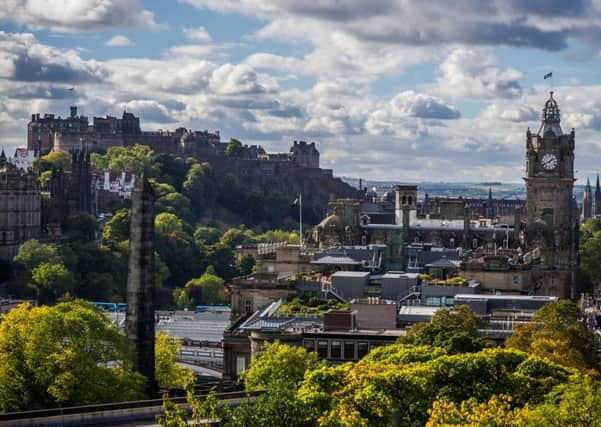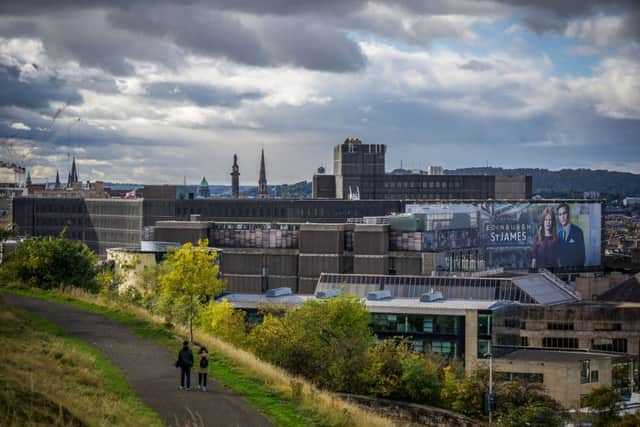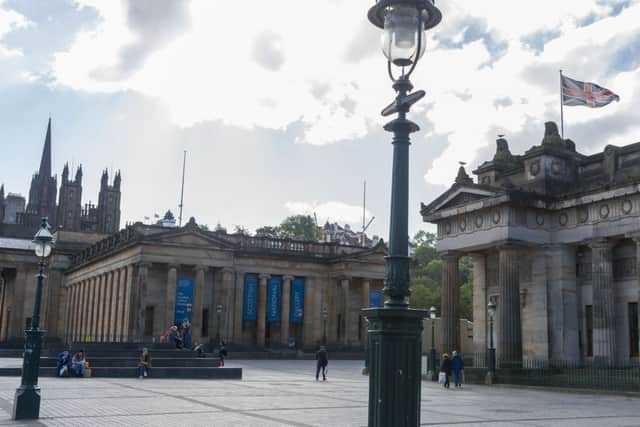20 memorable quotes that celebrate Edinburgh


DOWNLOAD THE EDINBURGH EVENING NEWS APP ON ITUNES OR GOOGLE PLAY
Advertisement
Hide AdAdvertisement
Hide AdHere are some of the most famous quotes which sum up Edinburgh perfectly.


“The view of Edinburgh from the road before you enter Leith is quite enchanting: it is, as Albert said, fairy-like and what you would only imagine as a thing to dream of, or to see in a picture.”
Queen Victoria made her first visit to Scotland in 1842, just five years after becoming Queen. She noted this description of Edinburgh in her journal at the time, marvelling at the beautiful views of the Castle, Calton Hill and Arthur’s Seat. She was less impressed with Leith, however.
“This is a city of shifting light, of changing skies, of sudden vistas. A city so beautiful it breaks the heart again and again.”
Advertisement
Hide AdAdvertisement
Hide AdEdinburgh-based author Alexander McCall Smith has written several novels set in the city, including 44 Scotland Street and The Sunday Philosophy Club. This quote of his has been used as part of an art installation to promote Edinburgh’s status as the first UNESCO City of Literature. The Royal Mile is one of many picturesque streets in Edinburgh


“The Scots think of it as their capital; they’re too possessive, Edinburgh belongs to the world.”
Edinburgh-born artist Richard Demarco has been a champion of visual and performing arts in the city for decades. This quote sums up the international feel of cultural events like the Edinburgh Festival Fringe and the Edinburgh International Festival.
“Enchanting… [Edinburgh] shall make a delightful summer capital when we invade Britain.”
Advertisement
Hide AdAdvertisement
Hide AdThis rather more chilling quote is attributed to Joseph Goebbels, Hitler’s chief propaganda minister. In an alternate reality, perhaps Edinburgh could have become the summer home of the Nazi leaders.


“Half a capital and half a country town, the whole city leads a double existence; it has long trances of the one and flashes of the other; like the king of the Black Isles, it is half alive and half a monumental marble.”
Robert Louis Stevenson’s Edinburgh: Picturesque Notes, from which this quote is taken, is full of beautiful descriptions of Auld Reekie. Despite being set in London, Stevenson’s famous tale of Jekyll and Hyde is thought to be heavily inspired by Edinburgh because of this ‘double existence’.
“Edinburgh is a hotbed of genius.”
This famous quote from Scottish poet and author Tobias Smollett refers to Edinburgh’s Enlightenment of the 18th century. The city was associated with many writers, philosophers, scientists and academics, including David Hume, Adam Smith and Francis Hutcheson. From actors to poets, Edinburgh has left a lasting impression on many famous visitors


“It is quite lovely – bits of it.”
Advertisement
Hide AdAdvertisement
Hide AdSome visitors may not have fallen head over heels in love with Edinburgh, such as Oscar Wilde. His famous quote hints at a less romanticised version of the city, but still gives the literary seal of approval to Auld Reekie.
“But Edinburgh is a mad god’s dream.”
One of the principal figures behind the Scottish Renaissance of the mid-20th century, Hugh MacDiarmid, was an influential poet and writer. This quote, taken from his poem Edinburgh, is immortalised on a plaque outside the Scottish Parliament along with quotes from other significant Scots.
“I always feel that when I come to Edinburgh, in many ways I am coming home.”
This quote from much-loved late British actor Alan Rickman, a regular at many of Edinburgh’s festivals, sums up exactly what many of us feel about the city. Even for those who are visitors or adoptive citizens, Edinburgh feels like a welcoming and homely city.
Advertisement
Hide AdAdvertisement
Hide Ad“Beautiful city of Edinburgh, most wonderful to be seen; with your ancient palace of Holyrood and Queen’s Park Green; and your big, magnificent, elegant New College; where people from all nations can be taught knowledge.”
William McGonagall is widely regarded as one of the worst poets in English literature, and his unintentionally amusing poetry has several odes to Edinburgh. He’s probably the only poet in the world to rhyme ‘sorrow’ with ‘Edinburgh’ – found elsewhere in this poem named Beautiful Edinburgh.
“Edinburgh isn’t so much a city, more a way of life… I doubt I’ll ever tire of exploring Edinburgh, on foot or in print.”
Ian Rankin’s series of Inspector Rebus novels are some of the most popular books set in the city. One of the major contributors to the tartan noir genre, Rankin began his writing career whilst studying English Literature at the University of Edinburgh in the 1980s. Edinburgh has provided the setting or inspiration for many novels
“Edina! Scotia’s darling seat!”
Advertisement
Hide AdAdvertisement
Hide AdAlthough he originally hailed from Ayr, Scotland’s national bard was rather fond of the capital city, as referenced in this Address to Edinburgh. Burns lived in Edinburgh for a couple of years at the height of his career.
“It seemed as if the rock and castle assumed a new aspect every time I looked at them; and Arthur’s Seat was perfect witchcraft. I don’t wonder that anyone residing in Edinburgh should write poetically.”
Washington Irving (best known for his short stories Rip Van Winkle and The Legend of Sleepy Hollow) was one of the first American writers to gain international success in Europe. In 1817, he travelled to Edinburgh to visit Walter Scott and was enchanted by the city.
“Piled deep and massy, close and high; Mine own romantic town.”
Advertisement
Hide AdAdvertisement
Hide AdThis famous line is taken from the epic poem Marmion. Scott, who was born in College Wynd on the Cowgate, is one of the most significant figures in Scottish literature and the Scott Monument is the largest monument to a writer in the world.
“My dear Sir, do not think that I blaspheme when I tell you that your great London, as compared to Dun-Edin, ‘mine own romantic town’, is as prose compared to poetry, or as a great rumbling, rambling, heavy Epic compared to a Lyric, brief, bright, clear, and vital as a flash of lightning.”
Charlotte Bronte In this letter of 1850, author Charlotte Bronte tells her companion that London and Edinburgh are two very different cities. She even makes reference to the famous line from Marmion, which she also quoted in her novel Jane Eyre.
“The most beautiful of all the capitals of Europe.”
Sir John Betjeman was the Poet Laureate of the United Kingdom from 1972 until 1984. Betjeman was a big fan of Victorian architecture, which explains why he was so fond of Edinburgh’s traditional tenements and town houses. The beautiful architecture and scenery is often referenced in quotes about Edinburgh
Advertisement
Hide AdAdvertisement
Hide Ad“When I looked out in the morning it is as if I had waked in Utopia.”
George Eliot – was one of the leading writers of the Victorian era. She was one of many authors to be inspired by the city after a visit to Edinburgh.
“Coming back to Edinburgh is to me like coming home.”
Charles Dickens was particularly fond of Edinburgh, as it was the place where he received the first significant public recognition of his work. He described Edinburgh as a “city so distinguished in literature and the arts” and visited several times throughout his life.
“And yet the place establishes an interest in people’s hearts; go where they will, they find no city of the same distinction.”
Advertisement
Hide AdAdvertisement
Hide AdThis quote from Robert Louis Stevenson sums up Edinburgh’s uniqueness. Although he travelled the world – eventually ending up in Samoa – Stevenson never found another place quite like his home city of Edinburgh.
“There’s no leaving Edinburgh, No shifting it around: it stays with you, always.”
Scottish poet, biographer and journalist Alan Bold made a significant contribution to Scottish literature during his lifetime. This quote of his explains the lasting impact the city has on both its citizens and visitors.